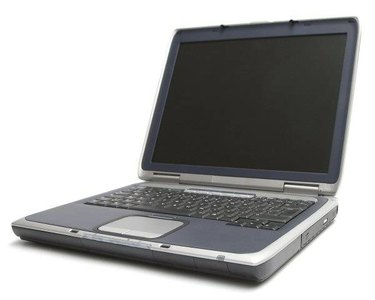
Laptop computers offer the convenience of mobility. Desktop computers, on the other hand, offer speed and performance at a low price. A laptop computer will almost always be slower than a desktop unit with the same processor, RAM and storage space. Faster and more powerful laptop computers are now available, but they are significantly more expensive than comparable desktops.
Features
Video of the Day
Many laptop computers have similar features as desktops, but are installed in a much smaller space. These smaller components often don't perform as well as larger versions. Also, laptops are more difficult and expensive to upgrade and are more likely to be damaged than desktops. These factors can cause a laptop's performance to lag seriously behind that of a desktop computer.
Video of the Day
Function
In computers, power is necessary for speed. Since laptops are designed for energy conservation, they will naturally run more slowly. The hard drive in a laptop is typically smaller than in a desktop unit, has less storage capacity and runs at a slower speed. Laptops also may contain a mobile processor which is designed to save on power, or a desktop processor which has been underclocked to run more slowly. Many laptops have less memory installed than desktops. They typically have slow onboard video and sound chips, as they are too small to fit most video and audio upgrade cards.
Benefits
The primary benefit of a laptop is that it's portable. You can take it just about anywhere. If you need a mobile computer for word processing and connecting to the Internet, a laptop is the best choice. However, desktop computers consistently perform better with graphics-intensive applications such as 3D games, videos and image processing software.
Considerations
Laptops can usually run exactly the same software as desktop computers with a minor to moderate performance penalty. If you're experiencing a severe problems with your laptop's speed, there may be another problem. Most errors that you'll experience with a computer are caused by software problems. It's far less likely that your system slowdown is caused by physical damage to your hardware.
Prevention/Solution
If you've gotten to the point where your laptop is running extremely slowly, you may need to reinstall your operating system. First, back up all your data. Then use the recovery disks that came with your computer to repair your operating system's installation without erasing you data. If this doesn't work, you will have to format your hard drive and reinstall the OS. This will restore your computer to its factory configuration. Reinstall your virus software and download all updates first. Then update your operating system. If you're still having a problem with speed after taking these steps, you may have a hardware problem. For best results, take your laptop in to a repair shop to be serviced by a professional. If the laptop is more than 5 years old, you should probably replace rather than repair it.